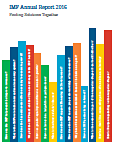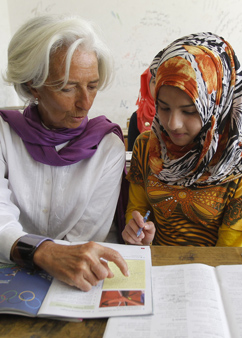Message from the Managing Director
The year covered in this Annual Report was marked by difficult challenges and milestone achievements.
The IMF membership—which grew to 189 in April 2016 with the addition of Nauru—faced the difficult task of reinvigorating modest growth at a time of uncertainty about a complicated global economy. At the 2016 Spring Meetings, the membership endorsed a three-pronged approach of monetary, fiscal, and structural policies to get the world economy back on a stronger and safer growth track. This remains our highest priority, and the Fund strengthened its commitment to supporting the community of nations by taking several important steps.
First, wide-ranging IMF quota and governance reforms approved in 2010 finally went into effect. These reforms significantly increase the Fund’s core resources and—crucially—make it more representative of the twenty-first century world economy by solidifying the voice of emerging market economies and developing countries.

IMF Managing Director Christine Lagarde
Second, the Fund responded to the United Nations’ call for attainable steps to enable developing countries to build the foundations for inclusive and sustainable growth over the next 15 years under the United Nations (UN) Sustainable Development Goals. The IMF stepped forward at the Third International Conference on Financing for Development, held in Addis Ababa, Ethiopia, in July 2015, offering a package of concrete commitments. These included increased financial support, enhanced policy advice, and technical assistance and other forms of capacity development focused on the unique challenges of development.
Third, to better understand the issues facing the global economy, the Fund embarked on an effort to identify the shortcomings and vulnerabilities of the international monetary system and to refine our role at the center of the global economy. This effort will continue the process of assimilating the lessons of the global financial crisis and define the policy response to new issues as they arise.
A crucial piece of this work was the completion of the regular review of the basket of currencies that make up the Special Drawing Right (SDR)— a process that ended in a decision to include the Chinese renminbi in the basket. This was an important step to integrate the Chinese economy into the international financial system and strengthen the global economy.
Fourth, there was a major unexpected event: the mass migration of refugees from Syria and other conflict afflicted states. The movement of millions, while primarily a severe humanitarian crisis, also has serious economic repercussions. The IMF is working with the countries affected in both the Middle East and Europe to analyze the macroeconomic issues they face and to help put in place the appropriate responses.
And lastly, a number of high-profile corruption cases have fueled international concern, and with a growing consensus that corruption can seriously undermine a country’s ability to deliver inclusive economic growth, addressing corruption globally—in both developed and developing countries—has become increasingly urgent. The IMF helps the membership address corruption through its policy advice on governance reforms, along with technical assistance and training.
This Annual Report highlights all of these issues, plus a wide range of policy matters that the Executive Board addressed during the year. The IMF membership speaks through the Board—literally on a daily basis—and the input of Executive Directors is at the core of our activities.











